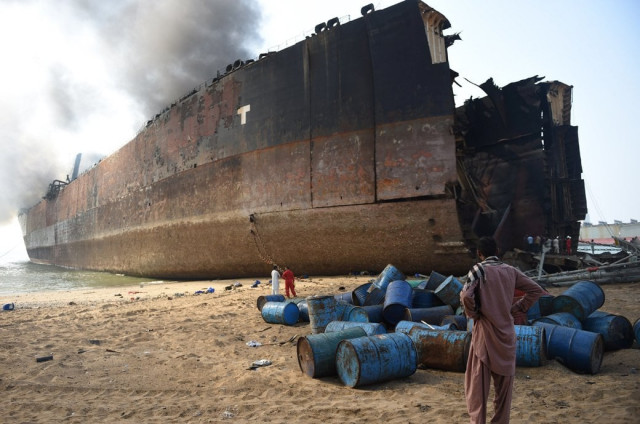Dangerous working conditions at Gadani
Working conditions are so hazardous that it is not surprising when accidents happen, but unsurprising if they don’t

A man looks at the wreckage of a burning ship a day after a gas cylinder explosion at the Gadani shipbreaking yard on November 2, 2016. PHOTO: AFP
There has been considerable silence by policymakers as well as the media on the dangerous working conditions in Gadani, which rights groups have time and again termed unsafe. According to independent accounts of workers and labour rights groups, nearly 850 labourers have lost their lives since the yard became operational in 1968, while more than 1,000 workers have lost their limbs or suffered other serious injuries. Since the ship-breaking yard was established, workers have been given pitiful wages and deprived of not only safe work standards but also basic necessities such as clean drinking water and safe housing. So the issues in Gadani have basically stayed the same since four decades now. Last year in May, the International Law and Policy Institute published a report titled Shipbreaking Practices in India, Bangladesh and Pakistan, in which Gadani was said to have “hazardous substances and wastes, as well as physical, mechanical, biological, ergonomic and psychological hazards.” The report said the substances strewn around the area “tend to be more dangerous because they contain substances that have long been banned.”
While ship-breaking is of course an important industry for Balochistan, it is extremely callous - to say the least - of government authorities to let the yard operate without even a monitoring body in place. The suspension of work at the ship-breaking yard should have happened months ago, but if it is finally happening now, the government must abide by its decision to not resume operations until it becomes a safe space.
Published in The Express Tribune, February 6th, 2017.
Like Opinion & Editorial on Facebook, follow @ETOpEd on Twitter to receive all updates on all our daily pieces.
















COMMENTS
Comments are moderated and generally will be posted if they are on-topic and not abusive.
For more information, please see our Comments FAQ